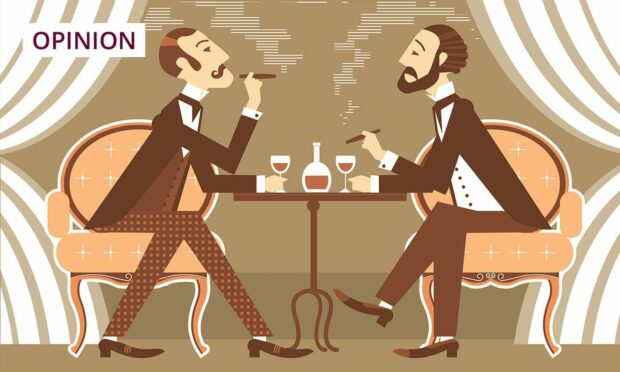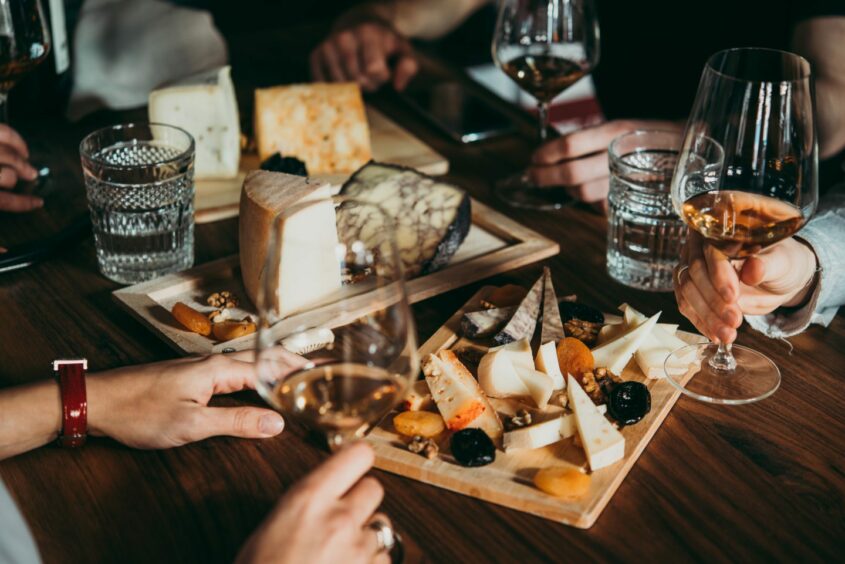I’ve never forgotten my earliest experience of the weird, wondrous world that is the private gentlemen’s club.
There are two reasons for this.
The first is that, upon requesting cheese for the pudding course, I was served a gigantic bucket of stilton and a spoon.
Thrilled at the extraordinary generosity of the portion, I began digging away.
I had scooped out about half the contents when a member of the waiting staff rushed over and politely removed the bucket from my piggy mitts.
It was then I realised that it was meant for everyone in the room, not just me.
Second, as I was collecting my tatty duffel coat on departure, I noticed a sign on the cloakroom wall announcing refurbishment of the swimming pool, accompanied by a plea to members – “particularly elderly members” – to remove their swimwear from the changing area, “some of which has been left there for many years”.
The image of knitted, knee-length Victorian costumes stretched over the vast, stilton-stuffed bellies of retired judges and bankers sprang irresistibly to mind.
The world of clubland hasn’t changed much over the years
That was a few decades ago, but the world of clubland hasn’t changed much.
For its adherents, this is its very appeal – it is possible to walk into one of these places and experience an environment not hugely different to what it was in the 18th century.
There has been a little accommodation with modern mores, of course. Some even admit women now, though this hasn’t been without its controversies.
A spat is currently under way at the venerable Athenaeum in Pall Mall, where its female chairman (their word) Dame Ann Limb is accused of importing “excessively woke” practices to the 200-year-old institution, where past members include Charles Dickens, JMW Turner and Charles Darwin.
The Times reports that there has already been an outcry over a rule change permitting “soft shoes in muted shades not designed for sports”.
But increases in the cost of wine and food, worries about the club’s financial health, and the unspecified wokery are a step too far and have led to an uprising.
One member speaks of Dame Ann’s “desire to transform a traditional English club into an institution that embraces the trends advocated by what is described as the cancel culture”.
These cliques place huge stock on tradition within gentlemen’s clubs
The internal politics are often vicious and bitter, perhaps because the stakes are so low and the booze so reasonably priced.
These hermetically sealed cliques place huge stock on tradition and the right sort of chap’s way of doing things. Interfere at your peril.
When I worked in London I parked my duffel coat (new, less tatty) in the cloakrooms of quite a few clubs.
I was only ever a guest – having initially wondered whether I should try to join one, I quickly realised I would be ridiculously out of place and ripe for the black ball, and not just because of my choice of jacket.
But I still enjoyed visiting, as a spectator, what is really a combination of museum and zoo of the upper classes.
There’s the gaming table in one club that has a semi-circle cut out of it, reputedly done to accommodate the belly of the 19th century Whig politician Charles James Fox.
One has a handrail on a grand staircase that was installed for a visit by the aged Napoleonic statesman Talleyrand.
A few years ago, we weren’t allowed to leave another for half an hour because the Queen was finishing up lunch with her pals in the next room.
Then, anthropologically speaking, there is the absorbing spectacle of your fellow diners, whom I’d place into three categories…
There are the wrinkly but recognisable former Tory government ministers, the peers, the ex-Cabinet secretaries, retired spymasters, diplomats and chief executives.
They swim in this world as a fish does in water: I once witnessed a distinguished old fellow using an ear trumpet.

Next, are those who aspire to great status, whom we might call the home-made gents. They buy their suits in Jermyn Street, polish up their vowels and store up the kind of anecdotes that are acceptable in elevated company. This is the spivvier end of clubland, as might be written by Evelyn Waugh.
Finally, there are the odd and the downright desperate – minor, penniless members of the aristocracy, dissolute denizens of Grub Street, and those living on a modest family allowance who are unemployed and largely unemployable.
These will repair to the library after lunch, with a bottle of port or brandy, and will soon be snoring beneath a half-read copy of the Daily Telegraph. They might well reside cheaply in one of the club’s small, austere bedrooms.
It’s easy to laugh at all this, and probably to sneer at it as an emblem of a class structure that is fracturing too slowly in Britain.
And it’s true that you can often smell the privilege and the ambition in the room, and map the elite networks.
But really, I don’t begrudge the chaps and, increasingly, the chapesses, each other’s company. I’m not sure too many of them would enjoy a night in the pub with my mates, or a visit to the Barrowlands. Horses for courses. Speaking of which, pass the cheese…
Chris Deerin is a leading journalist and commentator who heads independent, non-party think tank, Reform Scotland.



Conversation